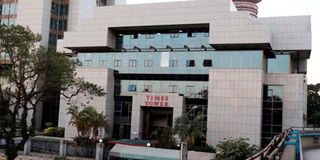
Times Tower in Nairobi, the headquarters of Kenya Revenue Authority (KRA). FILE PHOTO | DENNIS ONSONGO | NMG
Kenya Revenue Authority (KRA) officials received bribes to award a software contract to German-headquartered multinational SAP SE, court documents show.
The documents published by the US Justice Department’s Criminal Division show SAP’s subsidiary in Africa used a company located in Zimbabwe to route an unspecified amount of money to the KRA officials, helping it win the taxman’s tender in 2015.
The names of the KRA officials involved in the scheme have not been disclosed and it is not clear if they still work at the tax authority or any other government entity.
The taxman spends billions of shillings annually on tenders and its current plan shows it intends to spend about Sh10.6 billion on tenders in the financial year ending June.
In 2016, a year after the kickbacks, it rolled out SAP’s enterprise resource planning (ERP) platform, with the taxman then hailing the deal as the “dawn of a new era, positioning KRA as the first public sector organisation in the East Africa region to adopt SAP’s advanced real-time and in-memory technology.”
Court papers show the Zimbabwe firm, referred to as “GA Intermediary 1”, which was used by SAP Africa as a reseller to conduct business in Kenya, Malawi, Tanzania and Ghana, engaged in bid-rigging and arranged corrupt payments to government officials in all the four countries between 2014 and 2018.
Similar schemes by other intermediaries under SAP were used in South Africa, Malawi, Indonesia and Azerbaijan and have now been uncovered, forcing the German firm to pay over $220 million (Sh35.2 billion) to resolve the foreign bribery investigation.
In Kenya, the Zimbabwe firm allegedly bribed officials at the KRA and helped SAP Africa to improperly access draft tender documents so as to influence the outcome of the tender in SAP Africa’s favour and lock out other bidders.
“SAP Africa again used GA Intermediary 1 to help it improperly influence a tender by the Kenya Revenue Authority in 2015. Again, GA Intermediary 1 stood to benefit as the reseller,” say the court documents.
All bribe payments made by SAP Africa were inaccurately recorded as legitimate commission or other expenses in SAP’s books and records, pointing to weak internal accounting controls.
All tender documents from public entities in Kenya such as the KRA contain clauses asking for adherence with Public Procurement and Asset Disposal Act, 2015 and requiring tendering firms to include a declaration that they will not engage in any corrupt or fraudulent practice.
While the size of bribe allegedly given to the KRA officials has not been disclosed, a similar ploy by SAP’s subsidiary in Indonesia shows it was paying higher bribes for government tenders, with its officials saying that catching a big fish needed a larger bait.
“WhatsApp chat transcripts show one of the SAP Indonesia account executives messaging an Indonesia Intermediary 1 employee saying, ‘Hehehe… This is government bro, to catch a big fish we need to use a large bait (sic)’.”
The bribes took the form of money, shopping excursions and dining for the targeted officials and their families, pointing to the extent SAP’s intermediaries were willing to go to secure business.
The Kenya country manager for GA Intermediary used a similar scheme in Tanzania where it shared draft tender materials from the Tanzania Ports Authority (TPA) with a SAP Africa account executive on a thumb drive, giving the official information on bid specifications.
The SAP Africa executive then contacted individuals known as bribe “facilitators” around the time of the TPA tender to assist GA Intermediary 1 to pay bribes to TPA officials in exchange for the materials that helped SAP Africa win the tender.
The US Justice Department’s Criminal Division said SAP failed to implement sufficient payment approval controls to ensure that services were actually rendered, or expenses were actually incurred, before issuing payments to third parties.
US Justice Department’s Criminal Division says SAP Africa violated its own internal processes and procedures regarding due diligence when it failed to properly vet GA Intermediary 1, and ignored repeated red flags—including payment requests for vague and undefined deliverables— indicating the intermediary was funneling money to make improper payments.
Besides the multi-billion shillings fine, SAP has signed remedial efforts including termination of employees and third parties responsible for the misconduct and enhancements to internal accounting and compliance controls.







